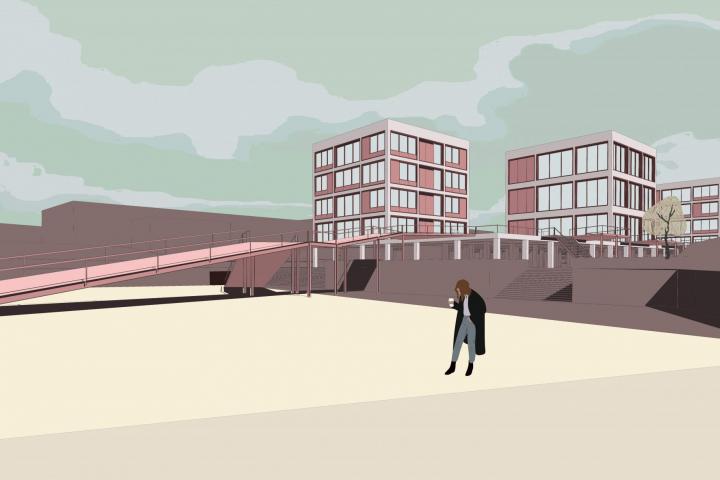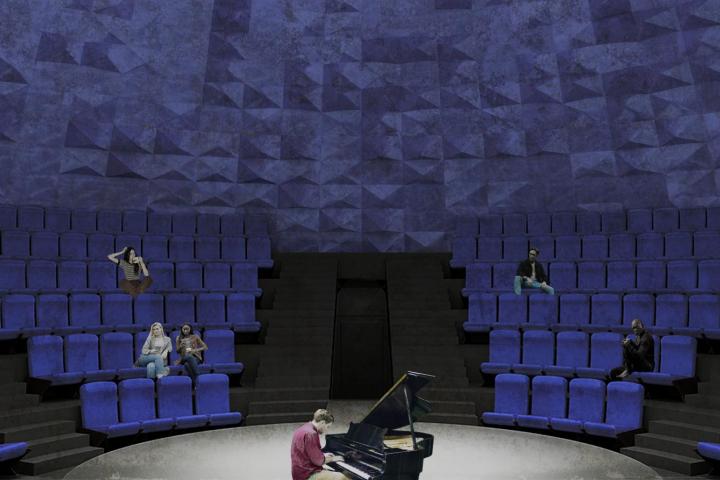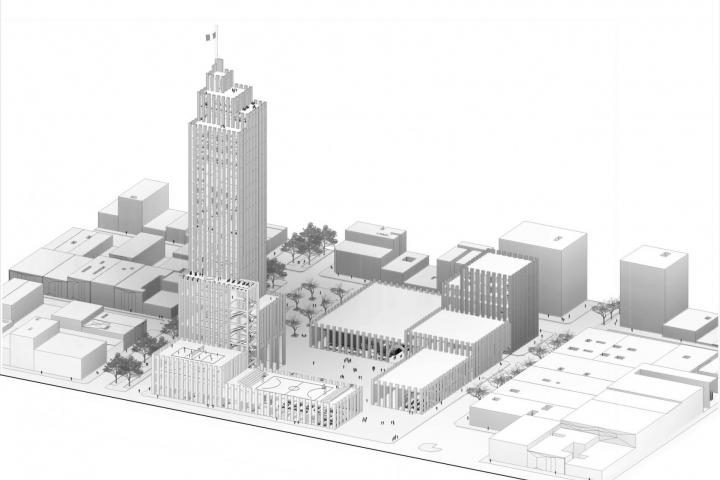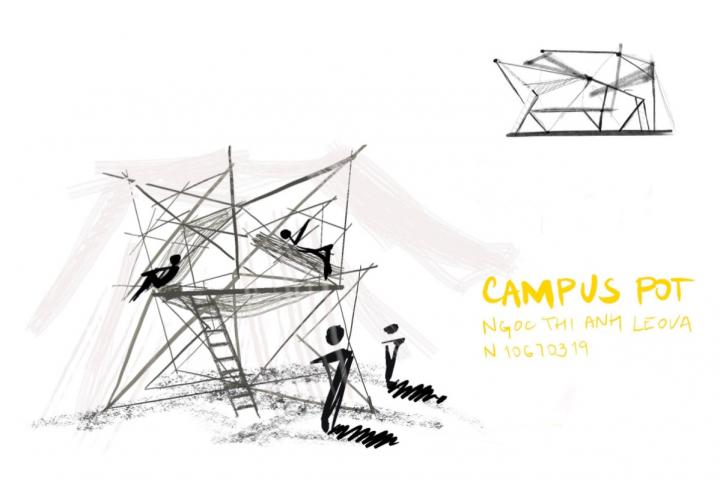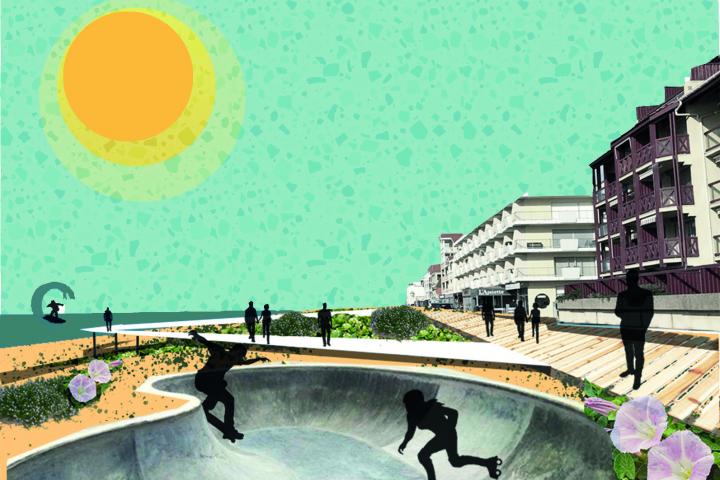
Forty student works were presented at the virtual opening held on 18 November, and their authors shared their experiences with their studies at foreign universities. The purpose of the event was to motivate new people interested in leaving in the coming academic year, as the selection of destinations remains varied despite anti-pandemic measures and the deadline for applications to the first round of the Erasmus + & Exchange 2021/22 competition is 6 December.
Zdeněk Völfl, Michaela Černá and Matěj Kováčik talked about their studies abroad, presenting their projects, photos and videos from schools, cities and roads. They encountered different approaches to teaching, studio work, but also leisure time, mentioning the systematic and organized nature of some universities, as well as slight chaos and incomprehensibility of communication between others. At some universities, for example, they are open 24 hours a day for students, while others close in the evenings, pointing out that a lack of rest does not benefit health or study. Different attitudes, a diverse range of opinions, solutions and values, but still all faculties had one thing in common - a stimulating environment for the study of architecture or design.
"Studying at a foreign school, living in a different environment, orienting yourself in it and working is an invaluable experience," says Irena Fialová, Vice-Dean for International Relations. Her words are also confirmed by students who traveled. "I think I've changed a lot. While studying abroad, I came across many different approaches and views on architecture, as well as other cultures and views on life in general. Thanks to this experience, I found my own opinions and attitudes better, I clarified what I want and expect from my field, but I also found myself in general, “Michaela Černá sums up her studies at the ETSAB School of Architecture in Barcelona.
In the studio project, Michaela Černá solved parking spaces in the vicinity of four railway stations and created spaces for co-working.
More about her project: https://www.fa.cvut.cz/cs/projekty-erasmus/16969-park-ride-work-baix-llobregat
Her classmate Matěj Kováčik, who spent a semester at the Faculty of Architecture and the Built Environment of TU Delft, was surprised that teachers are constantly discussing the design method with students. "They were not interested in the results, but rather how to achieve them. We also had more debates and excursions. One did not have to spend so much time studying, on the other hand, we were expected to become more involved in the events of the student community, "concludes Matěj Kováčik.
Matěj Kováčik cites a party during which he discovered a book about Buddhism in the owner's apartment as a key experience of his stay. She directed him not only to the topic of the final work, but also to the beginning of the search journey. "Without my separation from the comfort zone at home, nothing would have happened, probably," he describes the experience that may have changed his life. More about his project here: https://www.fa.cvut.cz/cs/projekty-erasmus/16971-chram-zvuku.: https://www.fa.cvut.cz/cs/projekty-erasmus/16971-chram-zvuku.
The basic condition of the Faculty of Architecture of the Czech Technical University for a semester or two-semester study stay abroad is to be a student of a master's study program, to know the language at least to level B2 and to succeed in an interview. There is a wide range of schools for students to study or practice abroad, not only at 56 schools in Europe but also overseas - from Argentina and Peru to Japan, Taiwan or South Korea.
Last year, about 80 students studied abroad and, conversely, about 150 foreign students came to the Faculty of Architecture of the Czech Technical University to spend a semester or two. The advantage of exchange programs is that tuition fees are free for students and they receive a scholarship, from which it is possible to cover part of the costs associated with studying and living abroad. Despite the complications with the coronavirus pandemic, most students successfully completed the summer semester at a foreign university.
Erasmus + is a European Union program supporting the international mobility of university students and teachers and cooperation in higher education in Europe. Thanks to Erasmus +, it is possible to study at another university in another country and with students from different parts of the world.
According to students, what are the general benefits of studying abroad?
· They learned to adapt quickly to the new environment.
· The new environment brought them new stimuli and ideas.
· Gained contacts and experiences for life.
· They got to know how people live and study in a given country, they got to know other cultures, customs and traditions.
· They compared priorities. They changed the way they thought.
· Improved communication skills and expanded vocabulary.
· Gain insight.
· They experienced adventure.
· They raised their self-confidence.
· They changed their lives.
· They found a new meaning to their life.
Variety of assignments during the semester in Brisbane
For design student Ngoc Thi Anh Le, a key one-semester experience at Queensland University of Technology in Australia was the variety of tasks they worked on in such a short time: “Compared to our system, which focuses on one or two projects during the semester, this was a big change. I learned to act much faster and to involve various fields and resources, "says Ngoc Thi Anh Le.
More about her project here: https://www.fa.cvut.cz/cs/projekty-erasmus/16970-odpocinkove-misto-v-kampusu-qut
Philosophical discussions on the landscape in Bordeaux
Eliška Šárová, a student of the Landscape Architecture program, considers her six-month stay at the National School of Architecture and Landscape ENSAP Bordeaux to be beneficial from a professional and personal point of view. "At school, I experienced a different way of teaching landscape architecture, which was more philosophical and artistic than teaching at our faculty. We read many professional articles about the landscape and then discussed them in class. We also drew a lot, painted and took pictures. In addition to teaching, I was enriched by my stay in Bordeaux. During my daily movement through the city, I was able to be inspired by many examples of quality landscape architecture and urbanism. "I have a lot of experiences from Bordeaux that I will never forget and I will definitely be happy to return there," says Eliška Šárová.
More about her project here: https://www.fa.cvut.cz/cs/projekty-erasmus/16960-po-bouri-krajinarsky-navrh-pro-lacanau-ocean-pobrezni-mestecko-ohrozene-prirodnimi-silami
How megacities work
Zdeněk Völfl studied one semester at the Faculty of Architecture and Urbanism at the PUCP University in Lima, Peru. He chose the 12 million Lima because he was fascinated by the organic nature of the rapid growth of cities, improvised buildings and is convinced that this experience will be extremely useful in today's world. In his studio project, he designed an extensive civic service center typical of South American megacities full of disparate operations, from the swimming pool to restaurants, theaters, cinemas, libraries, and medical facilities. In another project, he proposed how to solve the water supply in Lima, for which he performed an analysis of water management in the entire metropolitan area.
More about his project here: https://www.fa.cvut.cz/cs/projekty-erasmus/16955-obcanske-centrum-sesc-v-lime
You can download all photos here.
